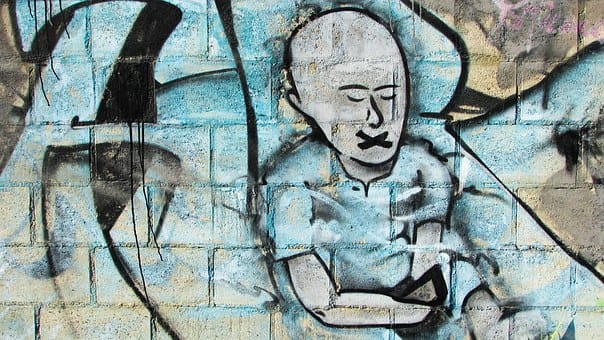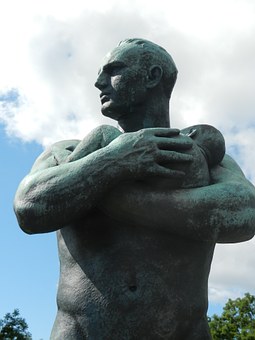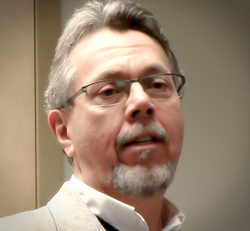|
“I Have No Mouth and I Must Scream” is the title of a science fiction story from the award-winning author Harlan Ellison. It is also, I believe, how some feel about their relationship with God. In the face of all the world’s upheaval, devastation, angst, war and terror why does God seem so silent, especially in this turbulent year of 2016? When reflecting on the biggest news stories of 2016 one can be hard pressed to assert that God was guiding the flow of events. Consider these highlights:
It would be easy to cynically sneer at the trauma in the world and declare that there is no God. But, do we really think God works this way; that he picks and chooses when to intervene in the world? Or - as I believe - has God already given us everything we need to thrive but we have chosen to ignore his guidance? If we want to see God active in the world, we must first learn how God touches us in our own lives, day by day. God is not “out there” somewhere above the cosmos directing the world. He is as close to us as our heartbeat. We are tenderly and intimately linked with God through our soul; through the very essence of who we are. God whispers to us in the same way that he whispered to Elijah in the cave on the mountain top. The challenge is: we must learn to quiet our own desire and to listen to that still small voice of God within. And then, we must act. God is alive in our hearts and it is through us that the grace of God is spread throughout the world. Following is a prayer written by Rabbi Jack Riemer which elegantly spells out the relationship between God and us. Given this way of looking at life, perhaps it is God who says: “I have no mouth and I must scream” as he watches us squander the gifts and grace we have received. We Cannot Pray to You By Rabbi Jack Riemer “We cannot merely pray to You, O God, to end war; For we know that You have made the world in a way That man must find his own path to peace Within himself and with his neighbor. We cannot merely pray to You, O God, to end starvation; For you have already given us the resources With which to feed the entire world If we would only use them wisely. We cannot merely pray to You, O God, to root out prejudice, For You have already given us eyes With which to see the good in all men If we would only use them rightly. We cannot merely pray to You, O God, to end despair, For You have already given us the power To clear away slums and to give hope If we would only use our power justly. We cannot merely pray to You, O God, to end disease, For you have already given us great minds with which To search out cures and healing, If we would only use them constructively. Therefore we pray to You instead, O God, For strength, determination, and willpower, To do instead of just to pray, To become instead of merely to wish. For Your sake and for ours, speedily and soon, That our land and world may be safe, And that our lives may be blessed. May the words that we pray, and the deeds that we do Be acceptable before You, O Lord, Our Rock and Our Redeemer.”
0 Comments
“What I do is me: for that I came.”
The above quote is from the celebrated poem “As Kingfishers Catch Fire” by Gerard Manley Hopkins. This poem explains that each person (and animal and thing) is placed here to be who and what we are: unique to the universe with nothing like us coming before in all time and nothing like us coming after throughout all of eternity. This is it. This is our time. Celebrate who you are, the poem extolls because that is why you were made. Do not deprive the universe of your beautiful essence. Kingfishers fish. Dragonflies fly. People “selves” according to Hopkins. Let the world experience the light of your being. And yet, the poem says, there is more. Unlike things or animals or the cosmos, we humans are called to do more than merely be ourselves. We are called to do justice and to act in grace and to make that a part of our life on this planet. But there is a catch: it is difficult to “do justice” or embody grace if we are not secure in who we are. I think about it this way: If we are not secure in who we are; if we don’t spend the hard time each day in quiet reflection of our own blessings and trials, then our attempts to do good become conditional. If we don’t acknowledge – and more importantly - accept our own sins, then the sins of others can easily be viewed with disdain. We end up in a cul-de-sac of unstated expectations: I will act for justice on behalf of others, but only if they behave in a manner I deem worthy. Here are a few examples: We can give a needy family food stamps but they must take a drug test, or I’ll forgive my friend if she apologizes first and means it. I’ve written before about the need to love ourselves. This isn’t some touchy-feely, new age mantra, it is vital. How we feel about ourselves drives how we treat all others. Critically important is how we arrive at the place where we can embrace ourselves. The best way, I believe, is to look at yourself as if through the eyes of God. Reflect on your blessings and know that you are loved by God. But also, acknowledge your failings and know that God loves you all the same. No matter what you do or say, you are God’s beloved. Once you embrace the idea that you are loved just as you are, then you can turn around and begin to show that same kind of unconditional love to others. Love of God, begets love of self. Love of self, begets love of others. Once we begin to see all others – without exception – as children of God, then justice and grace will naturally flow from us. We will become the embodiment of love: providing mercy within mercy within mercy. (Note: Below is the Kingfishers poem. Here is a link to an interpretation of it which may help to unlock some of the tricky phrasing and imagery.) As Kingfishers Catch Fire By Gerard Manley Hopkins As kingfishers catch fire, dragonflies draw flame; As tumbled over rim in roundy wells Stones ring; like each tucked string tells, each hung bell's Bow swung finds tongue to fling out broad its name; Each mortal thing does one thing and the same: Deals out that being indoors each one dwells; Selves — goes itself; myself it speaks and spells, Crying Whát I dó is me: for that I came. I say móre: the just man justices; Keeps grace: thát keeps all his goings graces; Acts in God's eye what in God's eye he is — Chríst — for Christ plays in ten thousand places, Lovely in limbs, and lovely in eyes not his To the Father through the features of men's faces. The idea that both beauty and terror comes to us in this life is expressed in a poem that
speaks to the very core of my beliefs. The poem - Go to the Limits of Your Longing - is written by the German mystic and poet Rainer Maria Rilke and is shared at the end of this post. For me, this poem describes the intimate relationship between God and each of us, as shown in the following excerpt. Let everything happen to you: beauty and terror. Just keep going. No feeling is final. Don’t let yourself lose me. Both beauty and terror will find us in our life, but we shouldn’t lose hope. My father died at age 66, thirty-one years ago this month. During the last ten years of his life, he suffered with early onset of Alzheimer’s disease. Watching my childhood hero slowly waste away was insufferable. I was living in Milwaukee at the time, but we would drive the ten hours back “home” to southwestern Pennsylvania each summer to visit my family. After my dad’s deterioration became too advanced, my mom was forced to place him in a nursing home during the last two years of his life. I could not bring myself to visit him there on my annual trek back. Once during this period, someone asked me about my dad. In response, I meant to say that he was in a nursing home, but what I actually said was that he was in a funeral home. I believe that is what I really felt. When my dad died, it was in many ways a relief for which I felt intense guilt. I sobbed when he died because he was gone; because his mind was wasted away long before he left; because I felt as if I betrayed his love for me when I couldn’t face seeing him in such a deranged state. I thought at the time that I didn’t love him as much as he had loved me. But now, these many years later, I am at peace with his death and with my actions. I just kept going and kept reaching out for the hand of God. Here is the poem. I hope you find it meaningful. Go to the Limits of Your Longing By Rainer Maria Rilke God speaks to each of us as he makes us, then walks with us silently out of the night. These are the words we dimly hear: You, sent out beyond your recall, go to the limits of your longing. Embody me. Flare up like a flame and make big shadows I can move in. Let everything happen to you: beauty and terror. Just keep going. No feeling is final. Don’t let yourself lose me. Nearby is the country they call life. You will know it by its seriousness. Give me your hand. An interesting interpretation of this poem can be found here. I learned about being a dad from my father and I hope I have passed on that advice to my son, Jake. Jake became a father for the first time in July. This is the guy who said he never wanted kids because it wasn’t fair to bring them into such a hostile and uncertain world. I often reminded him that each generation had a good excuse to remain childless. When I was young, there was the very real threat of nuclear annihilation; and for my parents there was the great depression and WWII and for their parents there was the world-wide depression of the late 1800s and the first world war. In reality, any excuse is a good excuse if one doesn’t want to do something.
As happenstance would have it, my son’s child was a surprise which quickly turned into a blessing once the baby was born. During the pregnancy Jake worried about becoming a dad, wondering if he had what it takes to be a good one; about the loss of his personal liberty and about settling down. I tried to reassure him that once he held the baby in his arms, a switch would turn on inside of him and love and the intense desire to protect this infant would become overwhelming. At least, that was my experience. And, that’s exactly what happened. Jake became smitten at the very moment he held his daughter Ava in his arms. Jake cradles the baby close to him and the majority of pictures we see are of Ava strapped to Jake’s chest and peering with her deep dark eyes out into the world from the security of her father’s embrace. My own dad was six years old when his father was killed in a coal mine explosion in West Virginia (under an alias name - which is fodder for a future post). So, my dad didn’t have a role model of how to be a father. And yet this massive, twice-wounded WWII Marine Corps Master Sargent was a great dad. He was hard and you wouldn’t dare bend his rules – but there was no doubt that each of the four of his children were deeply loved and that he adored our mother. This is the advice I want to convey to Jake: It isn’t about what you do as a dad – it is about how much you love and how secure your children feel in that love. I warn him to expect to screw up; to sometimes make bad decisions as a father. Being a parent is absolutely the toughest and most frightening thing I have ever done. The antidote for the inevitable bouts of failure as a parent is love. A child will learn to forgive a parent for their mistakes if she is secure in her parents’ love. If a parent can go to bed each night and answer yes to the question: did I show my kids that I loved them today – then that’s the best you can do. You will have given your children something they will never forget. And hopefully, something they will pass down to their own children. |
AuthorMichael Soika has been a community activist for more than 30 years working on issues of social and economic justice. His work for justice is anchored by his spiritual formation first as a Catholic and now as a Quaker. Archives
June 2018
Categories |





 RSS Feed
RSS Feed